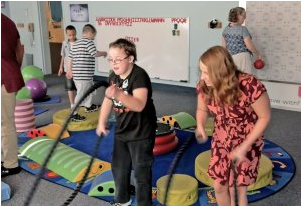 Sensory rooms not only help students with special needs feel more comfortable and empowered in the classroom, they may also keep them in their neighborhood schools, according to K-12 administrators.
Sensory rooms not only help students with special needs feel more comfortable and empowered in the classroom, they may also keep them in their neighborhood schools, according to K-12 administrators.
The carefully designed rooms may include dim lights to help students who are sensitive to light, weighted blankets to give them comfort or a swing they can gently rock on to become calm or spin in a circle for stimulation.
The Council for Exceptional Children says sensory rooms are getting popular in districts to help calm overstimulated or anxious students.
The National Center for Education Statistics found that students with special needs who spend 80 percent of the school day in a regular classroom jumped from 33 percent 25 years ago to more than 60 percent in 2014-15.
Advocates like Sean Goldman, executive director of student support services at Simi Valley USD in California, which has sensory rooms, says numbers should improve as more schools adopt such services. The Simi Valley district has 11 sensory rooms among its 28 schools, each designed to meet the needs of students within that building, Goldman says. Therapists and nurses also provide occupational and physical therapy.
Districts can expect to spend up to $10,000 per room, Goldman says. Equipment costs vary from $20 for exercise bands to up to $8,000 for heavy-duty swings that youngsters can lie on—belly down—or spin, he adds.
For the rooms to work, teachers and therapists overseeing them must be trained, says David Bateman, professor of special education at Shippensburg University in Pennsylvania, who has provided district PD.
Educators should create plans—known as a “sensory diets”— to determine each student’s’ needs. Diets could include anything from 10 minutes per day on a swing for a child who needs a break from normal class activity to 45 minutes of intensive therapy five days per week.
“Sensory rooms can be beneficial if specific activities are outlined,” Bateman says. “This is not a play room.”
Read the full article online in District Administration.
Source: District Administration | K-12 Sensory Rooms Offer Safe Space for Special Needs, https://www.districtadministration.com/article/k12-sensory-rooms-offer-safe-space-special-needs | Copyright © 2018 District Administration
Care Coordinators can arrange a free 30 minute Care Consultation so you can explore options with an expert.
We invite you to call or email our Care Coordinators at 650.688.3625 or careteam@stage.chconline.org to set up an initial Consultation appointment.





